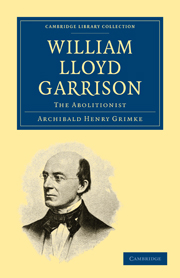Book contents
- Frontmatter
- Preface
- Contents
- CHAPTER I The Father of the Man
- CHAPTER II The Man Hears a Voice: Samuel, Samuel!
- CHAPTER III The Man Begins his Ministry
- CHAPTER IV The Hour and the Man
- CHAPTER V The Day of Small Things
- CHAPTER VI The Heavy World is Moved
- CHAPTER VII Master Strokes
- CHAPTER VIII Colorphobia
- CHAPTER IX Agitation and Repression
- CHAPTER X Between the Acts
- CHAPTER XI Mischief Let Loose
- CHAPTER XII Flotsam and Jetsam
- CHAPTER XIII The Barometer Continues to Fall
- CHAPTER XIV Brotherly Love Fails, and Ideas Abound
- CHAPTER XV Random Shots
- CHAPTER XVI The Pioneer Makes a New and Startling Departure
- CHAPTER XVII As in a Looking Glass
- CHAPTER XVIII The Turning of a Long Lane
- CHAPTER XIX Face to Face
- CHAPTER XX The Death-Grapple
- CHAPTER XXI The Last
- Index
CHAPTER XVII - As in a Looking Glass
Published online by Cambridge University Press: 05 February 2012
- Frontmatter
- Preface
- Contents
- CHAPTER I The Father of the Man
- CHAPTER II The Man Hears a Voice: Samuel, Samuel!
- CHAPTER III The Man Begins his Ministry
- CHAPTER IV The Hour and the Man
- CHAPTER V The Day of Small Things
- CHAPTER VI The Heavy World is Moved
- CHAPTER VII Master Strokes
- CHAPTER VIII Colorphobia
- CHAPTER IX Agitation and Repression
- CHAPTER X Between the Acts
- CHAPTER XI Mischief Let Loose
- CHAPTER XII Flotsam and Jetsam
- CHAPTER XIII The Barometer Continues to Fall
- CHAPTER XIV Brotherly Love Fails, and Ideas Abound
- CHAPTER XV Random Shots
- CHAPTER XVI The Pioneer Makes a New and Startling Departure
- CHAPTER XVII As in a Looking Glass
- CHAPTER XVIII The Turning of a Long Lane
- CHAPTER XIX Face to Face
- CHAPTER XX The Death-Grapple
- CHAPTER XXI The Last
- Index
Summary
Garrison was the most dogmatic, as he was the most earnest of men. It was almost next to impossible for him to understand that his way was not the only way to attain a given end. A position reached by him, he was curiously apt to look upon as a sort of ultima thule of human endeavor in that direction of the moral universe. And, notwithstanding instances of honest self-depreciation, there, nevertheless, hung around his personality an air and assumption of moral infallibility, as a reformer. His was not a tolerant mind. Differences with him he was prone to treat as gross departures from principle, as evidences of faithlessness to freedom. He fell upon the men who did not see eye to eye with him with tomahawk and scalping knife. He was strangely deficient in a sense of proportion in such matters. His terrible severities of speech, he visited upon the slave-power and the Liberty party alike. And although a nonresistent, in that he eschewed the use of physical force, yet there never was born among the sons of men a more militant soul in the use of moral force, in the quickness with which he would whip out the rapiers, or hurl the bolts and bombs of his mother tongue at opponents. The pioneer must have been an unconscious believer in the annihilation of the wicked, as he must have been an unconscious believer in the wickedness of all opposition to his idea of right and duty.
- Type
- Chapter
- Information
- William Lloyd GarrisonThe Abolitionist, pp. 319 - 334Publisher: Cambridge University PressPrint publication year: 2010First published in: 1891



